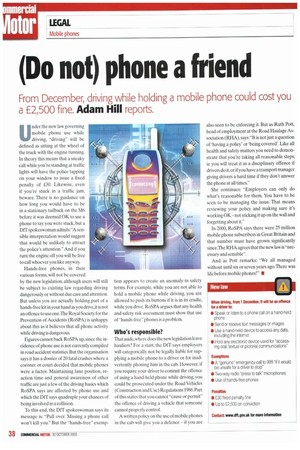(Do not) phone a friend
Page 38

If you've noticed an error in this article please click here to report it so we can fix it.
From December, driving while holding a mobile phone could cost you
a £2,500 fine. Adam Hill reports.
Under the new law governing mobile phone use while driving, "driving" will be defined as sitting at the wheel of the truck with the engine running. In theory this means that a sneaky call while you're standing at traffic lights will have the police tapping on your window to issue a fixed penalty of £30. Likewise, even if you're stuck in a traffic jam. beware. There is no guidance on how long you would have to be in a stationary tailback on the M6 before it was deemed OK to use a phone to say you were stuck, but a DfT spokeswoman admits: "A sensible interpretation would suggest that would be unlikely to attract the police's attention." And if you turn the engine off you will be free to call whoever you like anyway.
Hands-free phones, in their various forms, will not be covered by the new legislation, although users will still be subject to existing law regarding driving dangerously or without due care and attention. But unless you are actually holding part of a hands-free kit in your hand as you drive, it is not an offence to use one.The Royal Society for the Prevention of Accidents (RoSPA) is unhappy about this as it believes that all phone activity while driving is dangerous.
Figures cannot back RoSPA up, since the incidence of phone use is not currently compiled in road accident statistics. But the organisation says it has a dossier of 20 fatal crashes where a coroner or court decided that mobile phones were a factor. Maintaining lane position, reaction time and general awareness of other traffic are just a few of the driving basics which RoSPA says are affected by phone use and which the MT says quadruple your chances of being involved in a collision.
To this end, the DfT spokeswoman says its message is: "Pull over. Missing a phone call won't kill you." But the "hands-free" exemp tion appears to create an anomaly in safety terms. For example, while you are not able to hold a mobile phone while driving, you are allowed to push its buttons if it is in its cradle, while you drive. RoSPA argues that any health and safety risk assessment must show that use of "hands-freephones is a problem.
Who's responsible?
That aside.where does the new legislation leave hauliers? For a start, the EMT says employers will categorically not be legally liable for supplying a mobile phone to a driver or for inadvertently phoning him in the cab. However, if you require your driver to commit the offence of using a hand-held phone while driving, you could be prosecuted under the Road Vehicles (Construction and Use) Regulations 1986. Part of this states that you cannot "cause or permit" the offence of driving a vehicle that someone cannot properly control.
A written policy on the use of mobile phones in the cab will give you a defence — if you are also seen to be enforcing it. But as Ruth Pott, head of employment at the Road Haulage Association (RHA),says:"It is not just a question of 'having a policy' or 'being covered'. Like all health and safety matters you need to demonstrate that you're taking all reasonable steps, ie you will treat it as a disciplinary offence if drivers do it,or if you have a transport manager giving drivers a hard time if they don't answer the phone at all times."
She continues: "Employers can only do what's reasonable for them. You have to be seen to be managing the issue. That means reviewing your policy and making sure it's working OK —not sticking it up on the wall and forgetting about it."
In 2000, RoSPA says there were 25 million mobile phone subscribers in Great Britain and that number must have grown significantly sinc.e.The RHA agrees that the new law is"necessary and sensible".
And as Pott remarks: "We all managed without until six or seven years ago.There was life before mobile phones!" •




























































































































































































